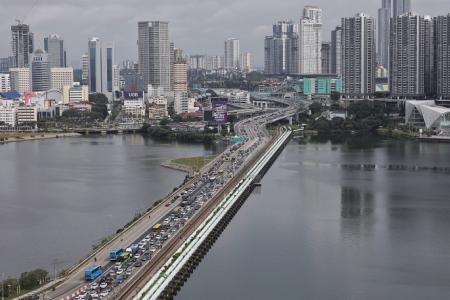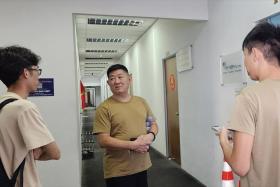M'sia decides not to review raw water rate with S'pore
Malaysia has decided not to seek a review of the raw water rate in its water agreement with Singapore, as continued growth in Johor’s industries means the southern state is likely to remain reliant on foreign sources of treated water beyond 2030.
“At present, it has been decided that the rate for raw water (sold to Singapore) need not be reviewed,” said Deputy Energy Transition and Water Transformation Minister, Mr Akmal Nasrullah Mohd Nasir, responding to a question by Pasir Gudang MP Hassan Abdul Karim in Parliament on Dec 2.
“Any change to the rates needs to consider its implications to the cost of purchasing treated water from Singapore, which is a critical need for Johor,” Mr Akmal said, adding that the Malaysian government takes a careful and cautious approach to ensure that any step taken would not burden the people.
The deputy minister said despite ongoing efforts to achieve self-sufficiency in Johor, the supply of treated water from Singapore is still a “critical need” for the state, given the proliferation of data centres and semiconductor plants there.
Currently, he noted that Johor imports an average of 16 million gallons of treated water per day (mgd) from Singapore.
The amount far exceeds the 5 mgd that Singapore is obliged to sell back to Malaysia under the 1962 Johor River Water Agreement, causing the state to incur additional costs of around RM180,000 ($54,300) per year.
The Pasir Gudang MP had asked Mr Akmal if the Malaysian government had any plans to review the 1962 Johor River Water Agreement, on the basis that it is not fair for Singapore to import 250 mgd of raw water from the southern state at a price of three sen per 1,000 gallons.
That water agreement, which expires in 2061, entitles Singapore to draw up to 250 mgd of raw water from the Johor River. In return, Johor is entitled to a daily supply of treated water of up to 2 per cent, or 5 mgd, of the water supplied to the Republic.
The Republic pays three sen per thousand gallons of raw water and sells treated water back to Johor at 50 sen per thousand gallons, at a fraction of the cost of treating the water. Singapore’s national water agency PUB draws water from the Johor River and treats the water at the Johor River Waterworks located near Kota Tinggi in Johor.
In efforts to ramp up the supply of raw water in Johor while at the same time reduce its dependency on the supply of treated water from Singapore by 2030, Malaysia has implemented the Zero Dependency project, said Mr Akmal.
This includes the construction of a riverside water reservoir along the Johor River (Sungai Lebak), a dam at Sungai Sedili Besar located in Kota Tinggi, and building new water-treatment plants.
But the project may not be achieved by 2030 due to ongoing developments in some sectors such as data centres and the semiconductor industry, he said, adding: “The supply of treated water from Singapore is still needed to fulfil the water needs for Johor.”
As Johor endeavours to spearhead Malaysia’s tech hub transformation, there are growing concerns that semiconductor plants and data centres will strain local resources such as treated water and electricity supplies in the coming years.
Rompin MP Abdul Khalib Abdullah weighed in to question the deputy minister on the supply and sustainability of raw water in Johor. He also questioned whether there will be economic implications for the state as Johor imports more treated water from Singapore.
Mr Akmal responded by saying that there are cost advantages for Malaysia to import treated water from Singapore at the price agreed upon under the 1962 agreement, rather than processing it themselves.
For the same amount of treated water that is sold from Singapore to Malaysia at 50 sen per 1,000 gallons, it would cost Malaysia RM1.80 to treat the raw water, he said.
“So there are some benefits there, as such, we need to achieve zero dependency with the capacity to produce enough treated water in Johor before we proceed with any new directions,” said Mr Akmal during the question-and-answer session in Parliament.
Malaysia and Singapore had previously agreed at the Leaders Retreat in 2023 to resume discussions on prices for raw and treated water, without prejudice to each other’s respective long-declared positions on the right to review the prices under the 1962 agreement.
The Straits Times has reached out to Singapore’s Ministry of Foreign Affairs for comment on the matter.
Get The New Paper on your phone with the free TNP app. Download from the Apple App Store or Google Play Store now


